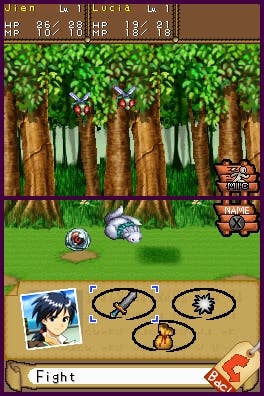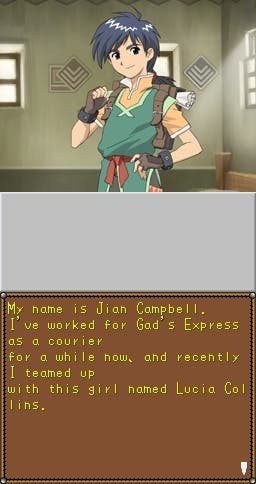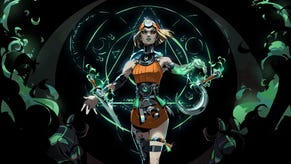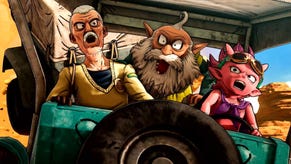Lunar: Dragon Song
What were you expecting? The moon on a stick?
Hello Doctor. *Huff* No, no, don't get up. *Puff* Yes, I did run here. *Wheeze* Strange, I feel slightly weaker now. Anyway, the usual spot, OK? Right, I'll set myself down here then.
What's that? Ah! Yes, of course. The problem this time:
It's been 11 years since the last Lunar game was released on the Sega CD. The first two games in the series were sweet, simple, straightforward Japanese RPGs, which won many hearts but few minds with their sweet, basic but solid mechanics and wistful but endearing storytelling. Now, 11 years is a long break between any series' instalments, yes? You might say a startlingly long time to make just a few improvements, no? A tweak here, a tweak there, just to stay abreast of genre developments which inch forward with all the grim determination of a tectonic plate, yes? OK, OK I'll get to the point.
What the hell happened here then?
Can I be more specific you say? Sure. I'll shoot from the semantic hip; suck sound-byte, therapist! Lunar DS is a disastrous, ruinous game. It devolves every RPG convention to its lowest common denominator until all that is left is a primeval abortion of a videogame. It's an embarrassment to its Lunar parents; its MUD ancestors are probably blushing zeros and ones that their DNA is scratching around anywhere near this touch-screen. Set 1,000 years before its predecessor, it feels like it was designed then too.
Its errors extend even to the choice of platform: The dual screen set-up exacerbates and highlights the game's ill-conceived form, ill-presented format, witless dialogue and a litany of design choices made by a developer seemingly with eyes clenched shut, fingers entombed in mittens, hammering random, ugly, soulless code into a prehistoric keyboard.

More particulars, less posturing you say medic? Right. Hear this:
Running lowers your hit-points.
Yes. You are literally physically penalised and destroyed bit by bit just for running through areas in the game in an intelligence-defying decision to strong-arm you into fighting more enemies. It's something made all the more excruciating when you consider the battle sections of the game themselves, which sap two-thirds of your playtime, and from which you will be desperate to run even though it hurts to do so. The battle system is comfortably the worst in 20 years of RPGs - that includes all of the Romancing Saga series' disorientating, brutalising randomness. Why's that? In a clamshell: you can't choose which enemy to target with your attacks.
At the start of each and every fight you pick either ‘automatic' (whereby you just sit back and yawn while the game controls your team of three in an inevitable lead up to victory against up to seven enemies) or ‘manual'. In the latter mode you pick one of three options: attack, item or special. No option for where to aim the offensive moves. That is the full extent of the strategy. So your team might be on their last limbs, blood trickling from bruising eyes, with two enemies left, the tough one on the right teetering on the verge of glorious death only for your character to randomly attack the weaker, less threatening enemy on the left, leaving the wounded monster to wipe out what little desire remained for you to continue. It a meaningless choice to take enemy targeting out and is indicative of a wider failure to understand the very basics of what makes a videogame fun or even reasonable.
There are some new ideas buried underneath the dry, cracked surface, straining to reach the light in your eyes. Two battle modes can be selected when in the field, switchable with one tap of the stylus. In ‘combat mode', you receive a variety of items required for different quests as you defeat enemies, but as a trade-off you don't earn experience points. In the other, ‘virtue mode', you earn experience as you battle against enemies and after each victory a clock timer counts down. If you manage to engage a new enemy (mercifully visible on the field) before the clock resets, then the previously defeated enemies won't respawn and you can work your way across the screen until all are gone. Once you've cleared the area, you gain some hit-points and magic points, and you can open a blue treasure chest that usually contains new armour or weaponry. It's convoluted and ultimately redundant: both modes could have been combined into one (like in all other RPGs) and not made one iota of difference to your wider enjoyment of the game.

Missions, the cement between the battles, are entirely linear. There are side quests which can be taken on to earn bonus money by defeating certain enemies or collecting and delivering items but these mundane objectives, both in the main story and side-missions, are unsullied by imagination. Usefully, you can talk to members of your team at any time for a quick reminder of where you need to go next and what you need to do once you get there; useful because chances are you were doing something else (like playing another game when you were meant to be reviewing this) when whichever identikit character first told you what your next mission was. There's a fair bit of backtracking to be done later on in the game, more evidence of unpleasant game design put in just to make reviewers say that this game takes over 30 hours to complete, as if that were some kind of glorious badge of honour.
The storyline, traditionally Lunar's strongest facet, is passably constructed but the awkward translation from the Japanese breaks any fluidity with each untidy sentence construct. There's a reasonably graceful narrative arc, but it's the kind of arc that a rope of horse urine makes as it streaks through the air, fizzing, yellow, sterile and steaming; a mesmerizing spectacle that you can't quite fully tear your eyes from until it's useless, dribbling end.
And another thing. Yes, I'm ranting now. The next developer to use their game's subtitle as an acronym for its host machine gets stabbed in their Dangly Scrotum. Yes I know I said it was marginally clever when Castlevania: Dawn of Sorrows did it but, well, that's the kind of mood this game puts you in: unforgiving, unreasonable, annoyed and irritable. Lunar: Dragon Song is so relentlessly amateurish that, at times, it feels like a schoolboy's GCSE game design project. This is one of the DS's flagship RPG games. It deserves far better than this.
*Sigh*
It's just not fair. *Sniff* But, I think I see now. That's why I come here Doc. You make things clearer. I think all this hatred and vitriol is born from underlying genuine disappointment. Lunar: Dragon Song could, should and would have been the DS's first great JRPG, especially considering its lineage. But rather, what we have here is a wasted opportunity; one that turns your anger to frustration then to plain, empty sadness. It's the kind of sadness one has for a baby dropped on its head and then raised by wolves. It's stupid, incoherent and turned bad by some silly mistakes and bad parenting decisions. You don't really want it in your house but, underneath it all, you know that's not its fault.
Thank you Doctor. I think I feel better now. No, don't worry, I won't run home.
And see you in eleven years for the next blue moon.









